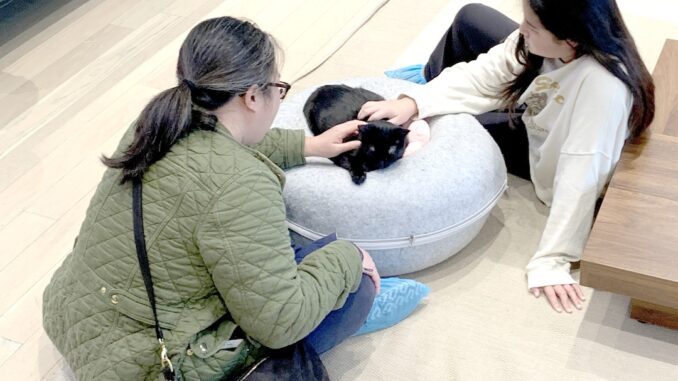
This story was first published in the Monday, Jan. 6 edition of the Daily Post.
BY BRADEN CARTWRIGHT
Daily Post Staff Writer
The city of Palo Alto is backing off its threat to shut down a cat lounge and adoption center at the Stanford Shopping Center — for now.
City Manager Ed Shikada said the city won’t enforce its deadline for Mini Cat Town to leave the mall by the end of the month.
Instead the city will make a decision in the spring on whether Mini Cat Town is following the city’s rules.
The city’s Planning and Transportation Commission is looking at what kinds of animal care facilities should be allowed, with an eye toward greater flexibility, Shikada said in an email on Thursday.
“No further code enforcement action will be taken with Mini Cat Town in the meantime,” Shikada said.
Mini Cat Town opened at the mall this summer with dozens of cats up for adoption. Kids pay $10 and adults pay $15 to pet cats for 30 minutes, and it costs around $500 to take one home.
The storefront gets crowded with shoppers peering through the glass, and Mini Cat Town has a waitlist for petting times on the weekends.
But on Dec. 2, a code enforcement officer told the owners of Mini Cat Town that their operation was considered “kennel and boarding” and not a retail pet store, according to an online petition.
“The city’s decision could force us to close our doors, leaving the cats without a safe space or visibility for adoption,” said the petition, which had 729 signatures yesterday.
Specifically the city’s zoning rules for the Stanford Shopping Center prevent the boarding of animals, and Mini Cat Town provides overnight stay of cats, Shikada said on Thursday.
But since the initial order was issued, Planning Director Jonathan Lait has paused enforcement to allow for more discussion, Shikada said.
Mini Cat Town is a nonprofit started in San Jose in 2015 by three sisters: Thi, Thoa and Tram Bui.
As kids, they saved their $1 weekly allowance to purchase food for feral cats that roamed their neighborhood.
As teenagers, the Buis learned how to humanely trap feral cats, have them fixed at an animal shelter and then released back into the neighborhood, no longer able to have kittens. The Buis said they saved their paychecks from Baskin Robbins to pay for their efforts.
By the time they graduated high school, all 100-plus cats in their neighborhood had been fixed, and any kittens were placed in homes, according to Mini Cat Town’s story.
In college, the Buis started fostering cats and documenting their work on social media. A video of their dog cuddling a foster kitten went viral, allowing the Buis to continue their work on a much larger scale.
The Buis started Mini Cat Town in December 2015 and say they’ve rescued over 1,500 cats. They have locations at malls in Milpitas, San Jose, Pleasanton and Santa Rosa.
Mini Cat Town hasn’t had issues at other locations despite being under the same retail classifications, the petition said.
“Reclassifying us as a kennel jeopardizes our mission and limits the public’s ability to adopt and support rescue efforts,” the petition said. “If other retail adoption models like Petco and PetSmart can operate in commercial zones, why can’t we?”
Co-owner Thoa Bui has turned down an interview because she said she’s still hoping to find a solution with the city.
“We don’t want anything to potentially make them angry and sway their decision,” she said in an email.
